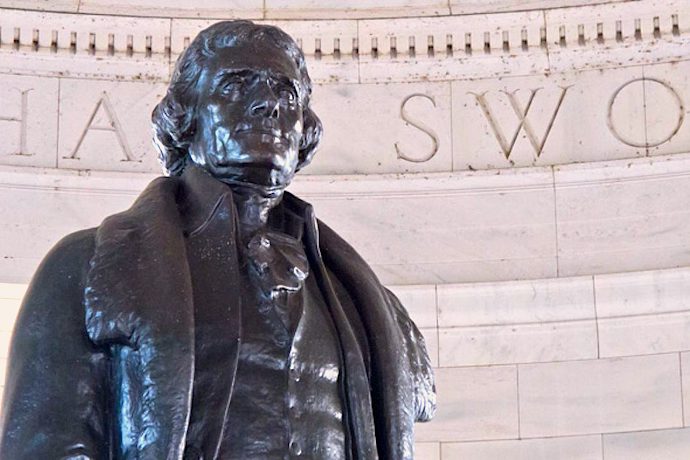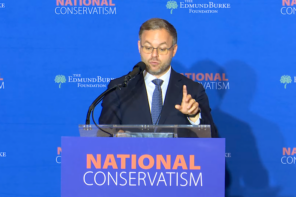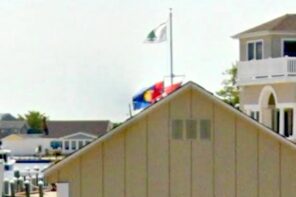Religious freedom has been at the center of American history since the founding. (And by the founding, I mean of the United States of America, not including the roughly century-and-a-half of colonial era.) There’s a story of religious freedom in the U.S. that isn’t widely or well understood—and is fiercely contested by the Christian Right.
Religious freedom was and is a revolutionary and liberatory concept that can disrupt entangled religious and political establishments and corrupt alliances of convenience. On Religious Freedom Day (January 16th) some will praise faith, and maybe the Founding Fathers, and some will call for interfaith understanding. Nothing wrong with all that. But if they fail to discuss the Virginia Statute for Religious Freedom, which the day is intended to commemorate, they will have muffed the meaning and power of the moment.
There are many roots of religious freedom, but the story of religious freedom as a constitutional right in the US begins with the Virginia Statute for Religious Freedom, which was originally drafted by Thomas Jefferson in 1777 and shepherded through the Virginia legislature by James Madison in 1786. The following year, Madison served as the lead author of the Constitution, and in 1789, as the lead author of the First Amendment. Thus, the Virginia Statute is rightly understood to be the clearest statement of the intentions of the Framers in matters of the right relationship between the individual, religion, and government.
Historian John Ragosta’s thumbnail history of the bill at the Thomas Jefferson Foundation at Monticello recognizes this. He quotes Madison saying that the Virginia Statute “is a true standard of Religious liberty: its principle the great barrier agst. usurpations on the rights of conscience. As long as it is respected… these will be safe.”
But so much of this has been lost in the mists of time and the robust efforts of the historical revisionists of the Christian Right, who falsely claim that the founders intended the country to be a “Christian nation.” In an effort to rescue the story of the origins of religious freedom, Congress sought in 1992 to commemorate the enactment of the Virginia Statute, designating January 16th as Religious Freedom Day, stipulating only that it be commemorated by a presidential proclamation.
Unfortunately, the public discussion of the Virginia Statute has been dominated by the Christian Right. Even the website ReligiousFreedomDay.com is owned by Gateways to Better Education, a Christian Right outfit that seeks to turn the Day to its own purposes. There’s no democratically inclined organization or any agency of government charged with education about the Virginia Statute.
Still, the 221 original co-sponsors in the House of Representatives were an ideologically diverse group, from Christian Right Republicans like Henry Hyde (R-IL) and Newt Gingrich (R-GA) to progressive African-American Democrats, like Ronald Dellums (D-CA) and John Conyers, (D-MI); the first openly gay member of Congress, Gerry Studds (D-MA), and feminist pioneer, Louise Slaughter (D-NY).
Jefferson would be pleased, since he wanted to be remembered for authoring the Declaration of Independence and the Virginia Statute, and for founding the University of Virginia. Ragosta says this was because Jefferson saw political freedom, religious freedom, and educational freedom as the great accomplishments of his life. Of the three, Jefferson “thought religious freedom was the foundation because without freedom to think and believe, you could not have the other two.”
The promise of religious freedom for all served as a rallying point among religious factions and made the Revolution, and the Constitution and its ratification, politically possible. Once instituted, the principle has helped every advance in human and civil rights ever since.
Nevertheless, we cannot ignore the fact that this revolutionary and liberatory principle and legislation were born in the context of the oppressive institution of slavery and the conquest of Indigenous peoples. Indeed, Jefferson, Madison and most of the framers of the Constitution owned slaves. What’s more, religious freedom has also been used as a justification for these and other oppressions to this day.
Religious Freedom Day then, is an opportunity to reflect on the whole of this history; how far we’ve come, how far we have to go, and to highlight the struggles of the day.
These things are not, as some seem to suggest, something to be avoided. They are necessary to understand the paradoxes of our history, and to effectively defend and advance religious freedom and social justice in our time. That Religious Freedom Day annually falls on or near the birthday of Dr. Martin Luther King Jr. gives us all the more reason and opportunity to reflect on this history.
Back to the future
Jefferson et al would not be surprised by the false claims of contemporary Christian historical revisionists that the U.S. was founded as a Christian nation. They also would not be surprised that the Christian Right and the Roman Catholic bishops (some of whom can be counted among the Christian Right themselves) have sought to redefine religious freedom to include religious exemptions from civil rights laws. Following from the language of the Religious Freedom Restoration Act (RFRA) and the Hobby Lobby decision of the Supreme Court, these are described as “conscience” exemptions. It has since become commonplace for Christian Right advocates to lump “religious freedom and conscience” together in this way.
As the Trump Court continues to assert itself, we can expect further erosion of the historic tradition of religious freedom that has directed our best aspirations for a more just and democratic society. The framers knew there would be times like these, but they hoped there would be leaders like Democratic State Senator John Marty of Minnesota to carry the struggle forward.
Marty rose to national prominence in 2018 when he stood up for Muslims, the non-religious, and others in response to a Christian nationalist initiative of the Minnesota State Legislative Prayer Caucus, a creature of the Christian Right state legislative campaign, formerly known as Project Blitz.
Fox News led a national smear campaign against Marty after he questioned the wisdom of placing posters declaring “In God We Trust” in the public schools. The smears stopped when he went on Fox to stand up for his integrity and his Lutheran faith, and stood down the smear mongers. He later explained to Religion Dispatches:
“Speaking as a Lutheran, I don’t want my religious beliefs watered-down by simplistic, generic, politically motivated, government-sanctioned mottos or practices. My faith teaches a radical love and respect for others. It teaches welcoming the refugee and showing compassion to those who are hurting. It does not advocate for the use of religious beliefs to divide. I spoke out for many who have a deep Christian faith and who don’t want our government to use our religion as a divisive club to beat up others for political reasons. And, we don’t want to force our beliefs on others.”
A sprawling political and legislative struggle over Project Blitz-inspired legislation has ensued across the country ever since.
In the two previous legislative sessions, Marty introduced a resolution recognizing Religious Freedom Day—but Prayer Caucus Republicans blocked the bill in the State Senate. He has introduced a fresh version of the bill this year, along with Sens. Omar Fateh, Jennifer A. McEwen, and Jim Carlson. Rep. Mike Freiberg will be introducing the bill in the House.
The bill is intended to designate Religious Freedom Day as an annual commemoration. Following hearings, it may pass this year, because Democrats have trifecta control of both houses of the legislature and the governorship. Marty’s bill is based on a model written by the BlitzWatch Coalition (full disclosure: RD is a publication of Political Research Associates, which is a member of the coalition).
In addition to the In God We Trust debacle, the Prayer Caucus also attempted to defund the Minnesota Historical Society because it had invited a respected legal historian to speak about how the nation’s founders did not, in fact, seek to create a Christian government. The Prayer Caucus also objected to how the 200-year-old Historic Fort Snelling—now a state-run historical site—had expanded its mission beyond the fort’s military history, to include the Dakota name for the area, Bdote, “with history spanning 10,000 years.” This history includes “Native peoples, trade, soldiers and veterans, enslaved people, immigrants, and the changing landscape.”
Meanwhile, Marty and State Representatives Athena Hollins and Mike Freiberg, along with State Sen. Jen McEwen have formed a 24-member Legislative Secular Government Caucus, a first-of-its-kind answer to the state legislative Prayer Caucuses that have advanced the legislative agenda of Project Blitz. A coalition of Washington, DC-based organizations have followed Minnesota’s lead, and are in the early stages of forming a “Religious Equality Legislative Network.”
Senator Marty spoke with RD by email in the run up to Religious Freedom Day 2023.
This interview has been edited for length and clarity.
RD: It seems like there’s a good chance your bill may become law this year. Why were you moved to do this and have stuck with it this far?
Marty: We introduced the Religious Freedom Day bill to recognize the history of our nation’s constitutional guarantees to freedom of conscience. The resolution, like the one adopted by the United States Congress 30 years ago, commemorates the January 16, 1786 enactment of the Virginia Statute for Religious Freedom, which laid the groundwork for our First Amendment right in the US Constitution to religious liberty.
This is at once an opportunity to educate Minnesotans on the threats to religious liberty, coming from the rise of Christian nationalism and an important civics lesson for the public and for public officials.
Just as the national Religious Freedom Day was adopted with strong, bipartisan support in Washington, I am optimistic that we can do it in Minnesota as well. Every state is so different. We all need to better understand the history of our own state in order to keep a watchful eye on the present and plan to ensure our rights for future generations as best we can.
All sides sometimes conflate religion or “faith” with religious freedom. But religious freedom according to the Virginia Statute and the First Amendment is not about religion. Religious freedom is about the right to believe as you will. Much like the right to vote is not the same as voting. I think we can learn to better connect the right to religious freedom with our best aspirations for religious equality. Do you think that your bill can help achieve that?
As we seek support from other legislators and the governor for this legislation, we begin this educational process—which will continue through the annual commemoration of the origin of this foundational constitutional right.
By having a thoughtful public discourse of what you described as our best aspirations for religious equality, we can help people understand that religious liberty guarantees everyone the right to their beliefs but does not allow businesses they’re affiliated with to discriminate against people with different beliefs.
Religious freedom is not intended to elevate the religious beliefs of the rich and powerful at the expense of the beliefs of everyone else. That’s why we need to sit up and take notice when some leaders of the Christian nationalist movement invoke “religious liberty” to justify denying religious liberty to others.
A number of years ago the Dominionist theorist Gary North spelled out the actual goals of his movement:
“We must use the doctrine of religious liberty to gain independence for Christian schools until we train up a generation of people who know that there is no religious neutrality, no neutral law, no neutral education, and no neutral civil government.
Then they will get busy in constructing a Bible-based social, political, and religious order which finally denies the religious liberty of the enemies of God.”
Their pseudo “religious liberty” proposals would allow private businesses to discriminate against others, because of the personal beliefs of people who own or work for the business. They also aim to have the government promote their beliefs and impose restrictions on the lives of others based on those beliefs.
By having a thoughtful public discourse of religious equality, we can inoculate people against the vision of Christian nationalist dominion, and perhaps the temptation to view people with differing beliefs as “enemies of God.”
The authors of the Virginia Statute and the Framers of the Constitution who followed, knew true religious freedom protects the liberty of all, even as they also knew that such equality was difficult to achieve. Religious freedom certainly did not immediately extend to Native Americans, whose religions have been ignored, even crushed, as the government sought to destroy their cultures. It’s been a vast struggle to extend the founding aspirations to all. The struggle continues, and commemorating Religious Freedom Day is a helpful tool in it.
We all need to educate ourselves so we’re prepared to defend and advance the right to religious freedom and equality in our time. The more I learn, the more I see how important it is to turn this around.
What is the Secular Government Legislative Caucus?
We created the Secular Government Legislative Caucus in response to the rise in Christian nationalism, where some people and politicians feel they have a license to impose their religious beliefs upon others. In doing so, we’re bringing together members of various faith communities as well as non-believers, agnostics, and humanists, all of whom are committed to preserving the freedom of conscience that’s guaranteed by the First Amendment’s provision of separation of church and state. The caucus will help us share information, and raise awareness of the theocratic agenda of Project Blitz.
The name of the caucus is an education in itself. You’ll note that we didn’t call it the secular caucus, which might suggest it was made up of atheists and humanists. We call it the secular government caucus because a secular government is religiously neutral and seeks to protect the religious freedom of all in our religiously plural society.
Jefferson and other leaders of the founding generation knew that the kinds of theocrats and monarchists they’d defeated in the 18th century would be back someday. Jefferson, seeking to inoculate the Virginia Statute against false interpretations in the future, late in his life wrote that the religious freedom of the Virginia Statute was not for Christians alone, but that it encompassed “the Jew and the Gentile, the Christian and Mahometan, the Hindoo, and infidel of every denomination.” Can you say something about how Jefferson’s clarification is as important today as it was then?
Jefferson’s clarification reminds us why it’s essential that we not let the historical revisionists twist the meaning of the First Amendment to serve their purposes. We cannot cede the definition of religious freedom and the narrative of our history to Christian nationalist politicians. As Thomas Jefferson so clearly articulated, religious freedom means freedom for people of all faiths and people of none.





